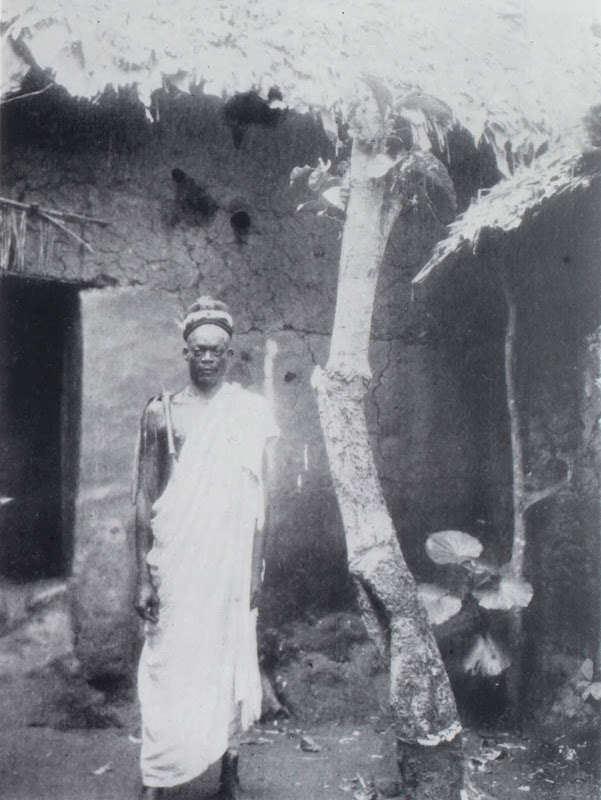 Igbo shrine house photographed by Gustaf Bolinder, 1930-31.
Igbo shrine house photographed by Gustaf Bolinder, 1930-31.
Ogu is divine retributive justice in the Igbo world view. In many communities iji Ogu is the act of holding ọmụ (tender palm fronds) at a sacred place whether at a woman’s hearth for instance or a shrine and declaring one’s innocence in a dispute or quarrel and for whatever one is accused of. The act is meant to appeal to the spirit of Ogu in order to vindicate the swearer, or in the case of a false declaration of innocence, an exposure and usually death. The act of iji Ogu can also include the calling of accusers names by the swearer, in this case if the swearer was falsely implicated then the wrath of Ogu falls on the accuser and the accused vindicated. Whenever the spirit, Ogu, acts on mortals in whichever way, that is when iji Ogu bara n’erere, meaning that the swearing to Ogu had yielded a spiritually potent result. Re is an interesting Igbo verb that’s associated with spiritual potency, like that of a talisman.
Ogu is paired with Ọfọ, which is roughly ancestral authority, which can also be authority of divinities, and together they form a two-fold form of spiritual appeal and justice in Igbo society. Unlike Ọfọ, Ogu, apart from the ọmụ, does not usually have any specific emblem and it can be freely and openly appealed to by men and women alike without a mediator. The other universal force that humans, of all walks of like, have the ability to appeal to without a mediator or emblem in Igbo society is the universal Chi.
As one’s own personal chi and eke is connected to all others, the course and trajectory [chinaedum] of these personal divine attributes cannot be blocked, diverted, or manipulated, you cannot block a chi on its course out of malice, out of spite, or by mistake because divine retributive justice in the form of Ọfọ na Ogu and Chi na Eke will clear the blockage in the road [chimaraoke]. Even though chi all come from the same source, some chi are considered stronger than other chi, this could be between a divinity and a mortal for instance, but it can also be between humans [chika]; between humans, the strength of the chi is determined by the eke, the divine mission apportioned to the person [chidera].
The work of Ogu na Ọfọ and Chi na Eke does not mean free-will is done away with, but rather divine order and balance is believed to always take precedence.
Edit: Just as a further note, Ogu is of the right hand just as Ọfọ is held in the left hand, in some communities ogirisi or some other shrub or shoot may be used instead of ọmụ when 'holding' Ogu, in other communities one may use the right hand alone and place it or a finger on the ground.










